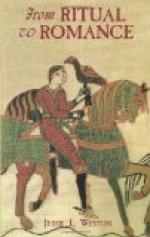in a very curious story related in the Perlesvaus,
which is twice referred to in texts of a professedly
historical character. The tale runs thus.
King Arthur has fallen into slothful and fainéant
ways, much to the grief of Guenevere, who sees her
lord’s fame and prestige waning day by day.
In this crisis she urges him to visit the Chapel of
Saint Austin, a perilous adventure, but one that may
well restore his reputation. Arthur agrees;
he will take with him only one squire; the place is
too dangerous. He calls a youth named Chaus,
the son of Yvain the Bastard, and bids him be ready
to ride with him at dawn. The lad, fearful of
over-sleeping, does not undress, but lies down as he
is in the hall. He falls asleep—and
it seems to him that the King has wakened and gone
without him. He rises in haste, mounts and rides
after Arthur, following, as he thinks, the track of
his steed. Thus he comes to a forest glade,
where he sees a Chapel, set in the midst of a grave-yard.
He enters, but the King is not there; there is no
living thing, only the body of a knight on a bier,
with tapers burning in golden candlesticks at head
and foot. Chaus takes out one of the tapers,
and thrusting the golden candlestick betwixt hose and
thigh, remounts and rides back in search of the King.
Before he has gone far he meets a man, black, and
foul-favoured, armed with a large two-edged knife.
He asks, has he met King Arthur? The man answers,
No, but he has met him, Chaus; he is a thief and a
traitor; he has stolen the golden candlestick; unless
he gives it up he shall pay for it dearly. Chaus
refuses, and the man smites him in the side with the
knife. With a loud cry the lad awakes, he is
lying in the hall at Cardoil, wounded to death, the
knife in his side and the golden candlestick still
in his hose.
He lives long enough to tell the story, confess, and
be shriven, and then dies. Arthur, with the
consent of his father, gives the candlestick to the
church of Saint Paul, then newly founded, “for
he would that this marvellous adventure should everywhere
be known, and that prayer should be made for the soul
of the squire."[10]
The pious wish of the King seems to have been fulfilled,
as the story was certainly well known, and appears
to have been accepted as a genuine tradition.
Thus the author of the Histoire de Fulk Fitz-Warin
gives a résumé of the adventure, and asserts that the
Chapel of Saint Austin referred to was situated in
Fulk’s patrimony, i.e., in the tract known
as the Blaunche Launde, situated in Shropshire, on
the border of North Wales. As source for the
tale he refers to Le Graal, le lyvre de le Seint Vassal,
and goes on to state that here King Arthur recovered
sa bounté et sa valur when he had lost his knighthood
and fame. This obviously refers to the Perlesvaus
romance, though whether in its present, or in an earlier
form, it is impossible to say. In any case the
author of the Histoire evidently thought that the
Chapel in question really existed, and was to be located
in Shropshire.[11] But John of Glastonbury also refers
to the story, and he connects it with Glastonbury.[12]




